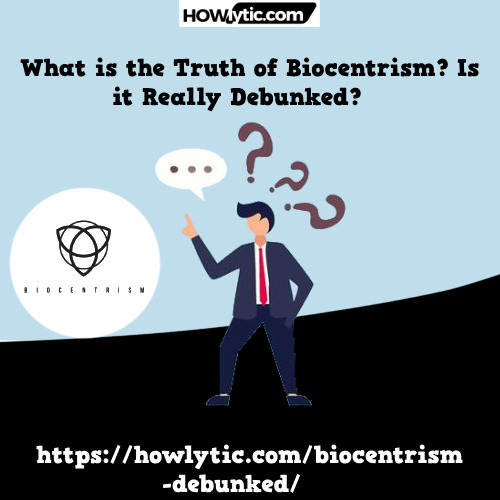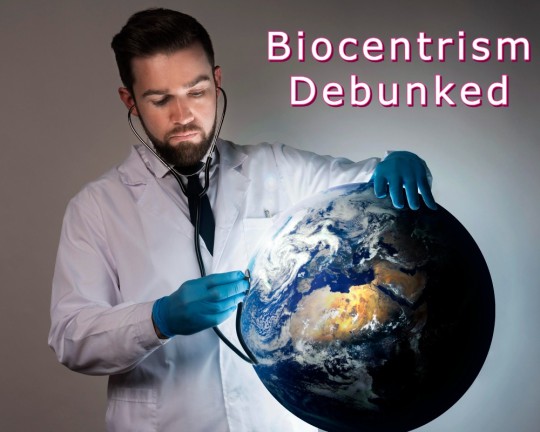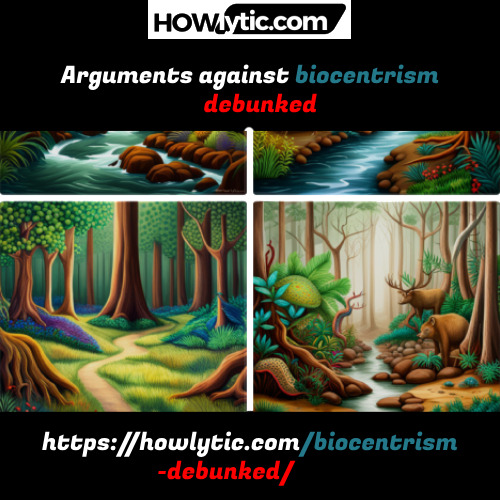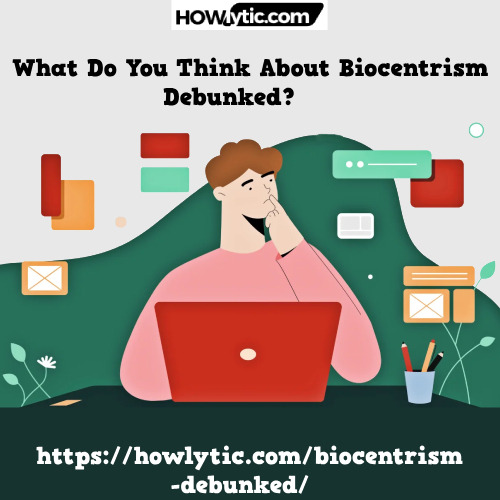#Biocentrism Debunked
Text
What is the Truth of Biocentrism? Is it Really Debunked?
Biocentrism Debunked is a theory proposed by Robert Lanza, a prominent scientist in the field of regenerative medicine and stem cell research. The theory suggests that biology, particularly consciousness, is central to understanding the universe. It proposes that life and biology are fundamental to the nature of reality, and that consciousness plays a crucial role in shaping the cosmos.

The idea of biocentrism has generated significant interest and debate within both scientific and philosophical communities. While some proponents view it as a groundbreaking theory that could revolutionize our understanding of the universe, others remain skeptical due to its departure from traditional scientific paradigms.
Critics argue that biocentrism lacks empirical evidence and does not provide testable hypotheses, which are fundamental principles in the scientific method. Additionally, some scientists have raised concerns about the potential for pseudoscientific interpretations and the blurring of lines between science and metaphysics.
As of my last update in January 2022, biocentrism has not gained widespread acceptance within the scientific community. While it presents intriguing ideas and challenges conventional thinking, it remains a topic of debate and skepticism among scientists.Whether Biocentrism Debunked is a matter of perspective. While it has not been widely embraced as a scientific theory, it continues to inspire philosophical discussions and speculative inquiry into the nature of consciousness and reality.
0 notes
Text
They believe that by recognizing the interconnectedness and interdependence of all living organisms, we can create a more sustainable and harmonious world.
0 notes
Text
True Insights into Biocentrism Debunked

Recent years have seen a major increase in the popularity of biocentrism, the idea that life and awareness are essential to comprehending the nature of our cosmos. As with every novel hypothesis, some detractors highlight issues. The book "Biocentrism Debunked? True Science of Life" examines the main defenses and refutations of this interesting idea.
Biocentrism is not precisely a revolutionary concept. Whether you choose to believe it or not, these ideas have their roots in earlier civilizations. But let's define biocentrism first before we board our time machine. Fundamentally, the biocentrist view holds that life and awareness are intrinsic to the cosmos rather than just by-products of it. In other words, life and awareness do not cause the cosmos to exist; rather, the opposite is true. It's a little bit confusing, isn't it?
Is Biocentrism Debunked? Truth in Life Science
Biocentrism questions our conventional, linear conception of the cosmos. Its fundamental tenet is based on the notion that life, rather than the cosmos, created life. It implies that our awareness is fundamentally shaped by the physical environment we live in. But is there strong evidence to support or refute it? Let's explore this further.
Let's start the time machine now.
Sources of the Concept
People who played with the concept that life had a pivotal role in the world existed in ancient civilizations centuries ago. Though they didn't use the word "biocentrism," certain philosophical reflections suggested that they had life-centric conceptions of reality. These concepts, nevertheless, were undeveloped and dispersed. Dr Robert Lanza appears in the present day, in the twenty-first century. Lanza revived this antiquated notion and gave it a contemporary, methodical framework by fusing science, philosophy, and a dash of boldness. His work propelled biocentrism from philosophical musings to a hypothesis worthy of contemporary discussion.
Changing Over Time:
Now, as the decades passed, both philosophy and science had their glow-ups. Naturally, biocentrism's perception and comprehension have also changed throughout time. Here's the interesting part: the development of quantum physics and the complex study of consciousness interacted like two rivers meeting, enhancing biocentrism's landscape. Some of the most bizarre quantum mechanical phenomena, such as particles that behave differently when viewed, appeared to allude to the concept that awareness influences reality. Biocentrism became more scientifically sound as a result of this merging, turning it from a purely philosophical theory to a testable hypothesis.
Principal Advocates:
Dr Robert Lanza may be the face of contemporary biocentrism, but he's not the only one singing its praises. Many scientists, philosophers, and intellectuals have stated ideas that are consistent with the biocentric worldview throughout the years. These proponents contend that to comprehend the cosmos, we must prioritize life and awareness rather than ignore them.
In a word, the concept of biocentrism dates back to prehistoric times. However, its contemporary incarnation is steeped in both cutting-edge science and profound philosophy. This viewpoint promises to question and redefine our perception of the cosmos and our position in it as we speed towards the future. Buckle up, it's time!
Basic Principles of Biocentrism
A philosophical viewpoint known as biocentrism questions the conventional understanding of the cosmos and our role in it. Contrary to the common view, which holds that life in the world developed as a consequence of natural processes, biocentrism asserts that life is the basic and important component of existence rather than just a byproduct of the universe. This paradigm shift in thinking centers the structure and meaning of the cosmos around living things, especially conscious ones.
The belief that life is an essential part of the cosmos rather than an incidental or secondary event is one of the core tenets of biocentrism. This viewpoint contends that the nature of reality is significantly shaped by awareness and living things. According to biocentrism, physical laws, time, and space are not immutable and unaffected by life, but rather are inextricably linked to the presence of sentient beings. Essentially, biocentrism implies that life is an active agent in the creation and continuation of the cosmos rather than only a passive spectator of it.
Furthermore, biocentrism highlights how all living things are tied to one another and to the universe. It suggests that life is deeply linked with the development of the cosmos, rather than the universe being a distinct, indifferent entity, but rather a dynamic, developing system. This viewpoint promotes a profound feeling of duty and reverence for all living creatures, as they are not separate from the world but rather essential to its survival. Biocentrism encourages us to reassess our stewardship of the earth and our connection with nature by acknowledging the relevance of life in the universe.
The traditional view is that life was born into the cosmos. That viewpoint is flipped by biocentrism.
Shaped by consciousness Reality: The course of events in the cosmos may be affected by our conscious perceptions.
Space and Time are Tools: Our awareness employs them as tools to comprehend the world, not as independent entities.
Rebuttals and Criticisms
Critics assert that there is an impersonal reality that cannot be seen by humans. How can biocentrism explain this?
Some people think that biocentrism misinterprets quantum physics, especially the observer effect.
The Case for Biocentrism: Supporting Data
The Double Slit Experiment contends that the presence of awareness may cause particles to act differently while being seen.
Quantum entanglement is a phenomenon in which nearby particles seem to be linked, suggesting the existence of a sentient world.
The Anthropic Principle: What makes the constants of nature ideal for life? Could it be that life itself contributed to their setting?
Consequences for Daily Life of Biocentrism
Accepting biocentrism may cause our worldviews to change in terms of how we perceive life, death, and everything in between. It could have an impact on how we feel about issues like the environment and animal rights.
Adopting a biocentric perspective may result in significant transformations in our everyday perspectives and interactions with the world. A significant outcome is a change in how we see life and death. The idea of a purely mechanical cosmos, where life is meaningless and death is the final conclusion, is challenged by biocentrism. Rather, it inspires us to see life as an essential and interwoven component of the universe.
This viewpoint might help us reassess our views regarding death and foster a deeper respect for the sacredness of life. Death may start to be seen as a metamorphosis rather than a definitive conclusion, and this change in perspective may have a significant effect on how we approach questions of existence and the meaning of human life.
Impact on Ecosystem
Additionally, biocentrism has a big impact on how we feel about animal rights and the environment. A greater feeling of empathy and responsibility for the natural environment is fostered by biocentrism, which acknowledges the inherent worth of all living forms and their interdependence. It pushes us to think about biodiversity preservation, animal welfare, and ecological health as fundamental components of our moral and ethical obligations.
This might lead to humans making more sustainable lifestyle choices, endorsing conservation initiatives, and pushing for laws that safeguard the environment and advance the welfare of animals. Essentially, biocentrism may encourage more harmony and compassion in our day-to-day interactions with the outside world, which will eventually lead to a more responsible and comprehensive way of life.
Conclusion
One thing is clear despite the ongoing debate: biocentrism has sparked interesting conversations in the scientific and philosophical worlds. Whether the idea is shown to be false or true, it compels us to reevaluate how we see the cosmos, life, and our position in it. Hopefully, further research, open discussions, and time will help us get closer to the truth.
FAQs
What is the main defense of biocentrism?
Skeptics primarily contend that biocentrism is insufficient to explain the existence of an objective world apart from human awareness.
How do space and time seem to be biocentrism?
According to the biocentric viewpoint, time and space are only the tools human awareness employs to comprehend the cosmos, not actual physical objects.
Is biocentrism debunked and supported by science?
Some experiments, such as the Double Slit, may allude to biocentrism. However, there is no concrete evidence, and interpretations are arbitrary.
Why does biocentrism need the Anthropic Principle?
It begs the issue of why the universe's constants are just right for supporting life. According to biocentrism, life itself may have had an impact.
What moral ramifications result from adopting biocentrism?
It may have a big impact on how we feel about things like animal rights and the environment.
How is biocentrism related to the observer effect?
According to the observer effect, particles react differently while being viewed. This may point to consciousness's influence on reality, supporting biocentric theories.
Read the full article
0 notes
Text
All You Need To Know About Biocentrism debunked
What if I told you that the very foundation of our understanding of life and consciousness could be turned on its head? Prepare to have your mind blown as we delve into the captivating world of biocentrism. This revolutionary theory suggests that not only are living organisms at the center of the universe, but they also hold the key to unlocking profound mysteries about existence itself. But…

View On WordPress
0 notes
Text
For More Information visit our site- https://www.unlockthewebs.com/biocentrism-debunked/
0 notes
Text
Does Your Mind Create The Universe?
Does Your Mind Create The Universe?
Have you ever had a dream that was so real, so rich in detail that when you woke up, you were kind of confused about reality. I kind of dream one time that I was on a pirate ship.
It was a dream. People now in case you’re, wondering no. I’ve, never been on a pirate ship. I don’t, really know what that’s like, but the details were so vivid in this dream, like the smell of the ocean water, the…
View On WordPress
#alternative science#biocentrism#biocentrism debunked#consciousness#double slit experiment#origin of the universe#quantum entanglement#quantum theory#relativity#robert lanza#simulation theory#theory of everything#wave particle duality
0 notes
Text
Ronald W. Pies, Nuances, Narratives, and the “Chemical Imbalance” Debate, Psychiatric Times (April 11, 2014)
Religions, cultures, and political groups all have their narratives—usually favorable or flattering accounts of their origins and beliefs. But narratives are not the same as truths, and usually lack the nuances of truth, which is rarely black or white. To see how this applies to psychiatry, try answering the question: Which one of the following statements best characterizes the American Psychiatric Association’s 2005 position on the causes of mental illness?
All mental illness is caused by specific and identifiable chemical imbalances in the brain.
The most serious mental illnesses, such as schizophrenia and major depression, are caused by specific chemical imbalances.
Chemical imbalances of some sort cause some mental illnesses.
The exact causes of mental disorders are unknown.
Now, if you were to give credence to a recent online polemic posing as investigative journalism, you would probably choose the first or second statement.1 In the narrative of the antipsychiatry movement, a monolithic entity called “Psychiatry” has deliberately misled the public as to the causes of mental illness, by failing to debunk the chemical imbalance hypothesis. Indeed, this narrative insists that by promoting this simplistic notion, psychiatry betrayed the public trust and made it seem as if psychiatrists had “magic bullets” for psychiatric disorders. (Lurking in the back-story, of course, is Big Pharma, said to be in cahoots with psychiatry so as to sell more drugs.)
However, if you had actually investigated the APA’s 2005 statement, you would have chosen answer 4. Here is the complete passage from the APA’s “Healthy Minds” Web site, intended for the general public:
The exact causes of mental disorders are unknown, but an explosive growth of research has brought us closer to the answers. We can say that certain inherited dispositions interact with triggering environmental factors. Poverty and stress are well-known to be bad for your health—this is true for mental health and physical health. In fact, the distinction between “mental” illness and “physical” illness can be misleading. Like physical illnesses, mental disorders can have a biological nature. Many physical illnesses can also have a strong emotional component [italics added].2
In fact, in the same year as the APA statement, Drs Thomas Insel and Remi Quirion3 wrote a seminal paper proposing that “mental disorders need to be addressed as disorders of distributed brain systems with symptoms forged by developmental and social experiences.” They went on to consider how “environmental factors during critical intervals of development exert long-term effects on gene expression” and suggest that “studying unconscious processes, motivation, or defenses, while at one time the sole province of psychoanalytic therapies, are now also in the domain of cognitive neuroscience.”
Does this sound like a simplistic chemical imbalance hypothesis? I don’t think so. But then, why do antipsychiatry groups and bloggers fail to note the nuances of what psychiatrists have been saying for at least the past decade? My guess is that doing so would undermine the derogatory narrative they wish to promote. And, of course, nuanced statements do not gin up public opinion or sell books.
OK—but weren’t there many psychiatrists in the 1980s and 1990s who advocated a purely biochemical theory of mental illness, often using the metaphor of the chemical imbalance to explain mental disorders to their patients? It’s difficult to answer this question, except in an anecdotal way, but it’s probably true that some psychiatrists did hold a purely biocentric view. And, alas, some undoubtedly used the expression “chemical imbalance” in their clinical practice, without putting it into a broader context for their patients.
It’s also true, as critics of the chemical imbalance hypothesis point out, that the term “imbalance” is misleading. To validate an imbalance, we must first have a quantitative understanding of the optimal neurochemical balance in the brain—and, given the scores of neurotransmitters now identified, this balance has yet to be ascertained. That said, I am not aware of any concerted effort by academic psychiatrists, psychiatric textbooks, or official psychiatric organizations to promote a simplistic chemical imbalance hypothesis of mental illness. That is what I meant when, in a 2011 Psychiatric Times piece, I referred to the chemical imbalance hypothesis as an urban legend.4
But still—shouldn’t psychiatrists in positions of influence have made greater efforts to knock down the chemical imbalance hypothesis, and to present a more sophisticated understanding of mental illness to the general public? Probably so. But there were sincere attempts to do just that, by a number of prominent psychiatrists—beginning nearly 50 years ago, with the developers of the catecholamine hypothesis. As psychiatrist Joseph Schildkraut and neuroscientist Seymour Kety wrote in 1967:
Whereas specific genetic factors may be of importance in the etiology of some, and possibly all, depressions, it is equally conceivable that early experiences of the infant or child may cause enduring biochemical changes, and that these may predispose some individuals to depressions in adulthood. It is not likely that changes in the metabolism of the biogenic amines alone will account for the complex phenomena of normal or pathological affect.5
Note the nuanced view of causality in this formulation—allowing for the possibility that chemical changes in the brain are effects of early experience, but also predisposing factors in some subsequent depressive episodes. Note that Schildkraut and Kety did not argue that chemical imbalances per se cause depression.
Psychiatry’s critics also conveniently omit reference to what was arguably the most prevalent paradigm in academic psychiatry, during the 1980s and beyond—the biopsychosocial model of Dr George Engel.6 Now, the biopsychosocial model has been subjected to much criticism, and some would argue that few psychiatrists nowadays employ the biopsychosocial model in a systematic, evidence-based manner.7,8 In 2001, Drs Glen O. Gabbard and Jerold Kay9 warned that “pharmacotherapy and psychotherapy, the major treatment modalities in psychiatry, have become fragmented from one another, creating an artificial separation of the psychosocial and biological domains in psychiatry.”
These are worrisome observations. But one thing is beyond dispute: the biopsychosocial model can hardly be reduced to a chemical imbalance theory of mental illness. As far back as 1991, in my book on psychotherapy for the general public, I wrote: “In recent years, the ‘biopsychosocial’ model of mental illness has gained prominence. This holds that mental problems have biological, psychological, and social roots. Therapy may therefore involve treatment in all three spheres.”10
I was far from the only psychiatrist to promote the biopsychosocial model—and none of my academic colleagues, to my knowledge, publicly endorsed a simplistic chemical imbalance model as a blanket explanation for all mental illness. Indeed, over 20 years ago, the late Dr Theodore Nadelson—one of my teachers and a highly respected psychiatrist—wrote in his foreword to my 1994 biopsychosocial textbook on psychiatric diagnosis and treatment:
Neuronal tissue grows in response to its environment at least as much as it is obedient to any lockstep process choreographed immutably the “gene machine.” We are creatures in nature, but we create our own nature. . . . If we are to understand patients and, as doctors, to help them, we require the broadest base. . . . [In addition to biological research] we should also pursue greater understanding of the psychological and social environment. That task is further informed by literature—poetry, philosophy, theater. That is our “biology” also.11
Ted Nadelson understood that the brain is the crucible in which all the elements of human life intermingle—including our genetic makeup; our brain chemistry; and the influences of parents, culture, ethnicity, and even diet. Derangements, deficiencies, or abnormalities in any of these biopsychosocial elements can lead to what we call, for lack of a better term, mental illness—which often represents the end result of innumerable interacting pathogens. Thus, in the introduction to my 1994 textbook, I wrote that “the central assumption throughout the text is that the clinician must be able to integrate the complex biological, psychological and sociocultural data of the case at hand.” Most well-trained psychiatrists, in my experience, have always understood this need and done their best to fulfill it in practice.
The Nobel Prize–winning psychiatrist and neuroscientist, Dr Eric Kandel, observed that “all mental processes, even the most complex psychological processes, derive from operations of the brain . . . as a corollary, behavioral disorders that characterize psychiatric illness are disturbances of brain function, even in those cases where the causes of the disturbances are clearly environmental in origin.”12(p39) But in practice, Kandel is no biological reductionist. He is certainly no fan of a chemical imbalance hypothesis! Rather, Kandel paints a picture of the “new” psychiatry, in which psychoanalytic and biological constructs complement and reinforce one another. It is time for psychiatry’s critics to drop the conspiratorial narrative of the chemical imbalance and acknowledge psychiatry’s efforts at integrating biological and psychosocial insights.
References
Levine BE. Psychiatry now admits it's been wrong in big ways -- but can it change? Truthout.org. March 11, 2014. Accessed March 11, 2014.
What is Mental Illness? PDF. American Psychiatric Association's "Healthy Minds" website, 2005. Accessed March 11, 2014.
Insel TR, Quirion R. Psychiatry as a clinical neuroscience discipline. JAMA. 2005; 294:2221-2224.
Pies R. Psychiatry’s new brain-mind and the legend of the “chemical imbalance. Psychiatric Times. July 11, 2011.
Schildkraut JJ, Kety SS. Biogenic amines and emotion. Science. 1967; 156:21-37.
Engel GL. The need for a new medical model: a challenge for biomedicine. Science. 1977;196:129-136.
Kontos N. Perspective: biomedicine—menace or straw man? Reexamining the biopsychosocial argument. Acad Med. 2011;86:509-515.
Ghaemi SN. The rise and fall of the biopsychosocial model. Br J Psychiatry. 2009;195:3-4.
Gabbard GO, Kay J. The fate of integrated treatment: whatever happened to the biopsychosocial psychiatrist? Am J Psychiatry. 2001;158:1956-1963.
Pies R. Psychotherapy Today: A Consumer’s Guide to Choosing the Right Therapist. Manning, Skidmore, Roth, 1991.
Nadelson T. In, Pies R: Clinical Manual of Psychiatric Diagnosis and Treatment: A Biopsychosocial Approach. Arlington, Va: American Psychiatric Press; 1994.
Kandel ER. Psychiatry, Psychoanalysis and the New Biology of Mind. American Psychiatric Publishing, Washington DC, 2005.
#psychiatry#controversy#paradigms#critique#biopsychosocial model#narratives#cultural narratives#medicine and culture#reductionism#debate#Eric Kandel#chemical imbalance model
0 notes
Text
What are the main arguments against biocentrism being debunked?
Biocentrism Debunked is a philosophical perspective that places a significant emphasis on the intrinsic value of life and living organisms. However, it has faced criticism and challenges from various quarters. Here are some main arguments against biocentrism being debunked:

Anthropocentrism Critique: Critics argue that biocentrism, while attempting to shift focus from human-centric views, merely replaces it with a different form of anthropocentrism where all life is valued primarily for its utility to humans. They argue that this still fails to fully appreciate the inherent worth of non-human life forms.
Inherent Subjectivity: Biocentrism can be criticized for its subjective nature. The determination of what constitutes "life" and the degree of value assigned to different forms of life can vary greatly among individuals and cultures. Critics argue that this subjectivity makes it challenging to establish a consistent and universally applicable ethical framework.
Practical Implications: Some argue that while biocentrism may offer compelling philosophical ideas, its practical implementation poses significant challenges. For instance, in scenarios where human interests conflict with the preservation of other life forms, it may be difficult to resolve these conflicts in a manner consistent with biocentric principles.
Ecological Considerations: Critics argue that biocentrism overlooks the complex interdependencies within ecosystems. While it emphasizes the intrinsic value of individual organisms, it may not adequately address the importance of ecological relationships and the well-being of entire ecosystems. This can lead to potential imbalances and unintended consequences in conservation efforts.
Clash with Utilitarianism: Biocentrism's emphasis on the intrinsic value of life can conflict with utilitarian approaches, which prioritize maximizing overall well-being or happiness. Critics argue that biocentrism's focus on the inherent worth of individual organisms may lead to decisions that prioritize the preservation of individual lives over the greater good of the overall ecosystem or human society.
Scientific Validity: Some critics argue that biocentrism lacks empirical evidence and scientific support. While it is primarily a philosophical perspective, critics contend that it should be grounded in scientific principles to be considered a robust framework for ethical and environmental decision-making.
While these criticisms challenge certain aspects of Biocentrism Debunked, proponents argue that it still offers valuable insights into the relationship between humans and the natural world and provides a basis for reevaluating ethical norms and environmental policies. As with any philosophical perspective, the debate surrounding biocentrism is ongoing, and its merits continue to be evaluated and refined.
0 notes
Text
What Do You Think About Biocentrism Debunked?
Biocentrism Debunked is a book written by scientist Dr. Robert Piccioni, which aims to refute the claims made in Robert Lanza's "Biocentrism: How Life and Consciousness are the Keys to Understanding the True Nature of the Universe." Piccioni criticizes Lanza's theory, arguing that it lacks scientific rigor and misinterprets quantum mechanics.

While I haven't read "Biocentrism Debunked" specifically, it's common for scientists to engage in debates and critiques of theories that challenge established paradigms. Scientific progress often relies on this process of critical evaluation and testing of ideas.
In the case of biocentrism, it's essential to recognize that while it offers an intriguing perspective on the nature of reality, it remains a speculative theory lacking strong empirical evidence. Critics like Piccioni raise valid points about the need for scientific rigor and evidence-based support for such radical ideas.Ultimately, the debate between proponents and critics of Biocentrism Debunked highlights the complexity of understanding the universe and the ongoing quest for deeper insights into the nature of reality. As with any scientific theory, it's crucial to approach it with skepticism and an open mind, while also demanding robust evidence and logical coherence.
0 notes
Text
Biocentrism Under the Microscope: Analyzing Its Claims and Controversies

Introduction
Biocentrism Debunked, a provocative philosophical hypothesis, posits that life and consciousness play a pivotal role in shaping the universe. While this theory might capture the imagination, it's essential to evaluate its claims through a lens of scientific rigor. In this article, we delve deep into the tenets of biocentrism and explore the critiques that have led many in the scientific community to question its validity.
The Pillars of Biocentrism
The Primacy of Consciousness: Biocentrism Debunked suggests that consciousness precedes reality, asserting that observation is necessary for the existence of the universe. This idea challenges the conventional scientific view that reality exists independently of an observer.
Quantum Mechanics and Reality: Proponents of biocentrism often turn to quantum mechanics to support their claims, citing phenomena like wave-particle duality and the observer effect as evidence of the connection between consciousness and reality.
Unpacking the Skepticism
Quantum Leap of Logic: While quantum mechanics is known for its counterintuitive and perplexing nature, leaping from quantum phenomena to the claim that consciousness is the sole arbiter of reality is a significant stretch. The principles that govern the microscopic world might not necessarily apply to the macroscopic reality we experience.
Ignoring Cosmic Evolution: The framework of biocentrism seems to disregard the evolution of the cosmos over billions of years. The laws of physics and the fundamental forces that have shaped the universe can be explained without invoking conscious observation.
Absence of Testable Predictions: A hallmark of scientific theories is their ability to make testable predictions. Biocentrism, unfortunately, lacks the specificity required for making predictions that can be verified through experimentation and observation.
Analogous Fallacies: Critics argue that biocentrism bears similarities to other ideas that have been debunked due to a lack of empirical support. Theories like vitalism, which suggested a life force distinct from physical and chemical processes, also fell out of favor due to a lack of scientific foundation.
Philosophical versus Scientific Claims: Biocentrism straddles the line between philosophical contemplation and scientific hypothesis. While it may offer a novel perspective on the nature of existence, its claims often lack the empirical rigor demanded by the scientific method.
The Boundary of Philosophy and Science
Biocentrism Debunked, despite its limitations as a scientific theory, serves as a compelling springboard for philosophical discussions about consciousness, perception, and the nature of reality. It challenges us to explore the boundaries between subjective experience and objective observation.
Conclusion
Biocentrism's audacious claims have sparked both fascination and skepticism within the scientific community. While its philosophical musings can inspire contemplation, the absence of empirical evidence, the extrapolation of quantum phenomena to macroscopic reality, and its divergence from established scientific principles raise significant doubts about its scientific validity. As we continue to explore the mysteries of the universe, it's crucial to distinguish between philosophical pondering and empirically grounded scientific theory.
0 notes
Text
True Insights into Biocentrism Debunked

Go in-depth on the subject of biocentrism. Has it been refuted or does it still stand up? Discover the actual science of life and consider the consequences of this revolutionary idea.
Recent years have seen a major increase in the popularity of biocentrism, the idea that life and awareness are essential to comprehending the nature of our cosmos. As with every novel hypothesis, some detractors highlight issues. The book "Biocentrism Debunked? True Science of Life" examines the main defences and refutations of this interesting idea.
Is Biocentrism Debunked? Truth in Life Science
Biocentrism questions our conventional, linear conception of the cosmos. Its fundamental tenet is based on the notion that life, rather than the cosmos, created life. It implies that our awareness is fundamentally shaped by the physical environment we live in. But is there strong evidence to support or refute it? Let's explore this further.
A Synopsis of Biocentrism's History
Biocentrism is not precisely a revolutionary concept. Whether you choose to believe it or not, these ideas have their roots in earlier civilizations. But let's define biocentrism first before we board our time machine. Fundamentally, the biocentrist view holds that life and awareness are intrinsic to the cosmos rather than just by-products of it. In other words, life and awareness do not cause the cosmos to exist; rather, the opposite is true. It's a little bit confusing, isn't it?
Let's start the time machine now.
Sources of the Concept
People who played with the concept that life had a pivotal role in the world existed in ancient civilizations centuries ago. Though they didn't use the word "biocentrism," certain philosophical reflections suggested that they had life-centric conceptions of reality. These concepts, nevertheless, were undeveloped and dispersed. Dr Robert Lanza appears in the present day, in the twenty-first century. Lanza revived this antiquated notion and gave it a contemporary, methodical framework by fusing science, philosophy, and a dash of boldness. His work propelled biocentrism from philosophical musings to a hypothesis worthy of contemporary discussion.
Changing Over Time:
Now, as the decades passed, both philosophy and science had their glow-ups. Naturally, biocentrism's perception and comprehension have also changed throughout time. Here's the interesting part: the development of quantum physics and the complex study of consciousness interacted like two rivers meeting, enhancing biocentrism's landscape. Some of the most bizarre quantum mechanical phenomena, such as particles that behave differently when viewed, appeared to allude to the concept that awareness influences reality. Biocentrism became more scientifically sound as a result of this merging, turning it from a purely philosophical theory to a testable hypothesis.
Principal Advocates:
Dr Robert Lanza may be the face of contemporary biocentrism, but he's not the only one singing its praises. Many scientists, philosophers, and intellectuals have stated ideas that are consistent with the biocentric worldview throughout the years. These proponents contend that to comprehend the cosmos, we must prioritise life and awareness rather than ignore them.
People also like: Akron Shooting Was Mistaken Identity, Not Racist
In a word, the concept of biocentrism dates back to prehistoric times. However, its contemporary incarnation is steeped in both cutting-edge science and profound philosophy. This viewpoint promises to question and redefine our perception of the cosmos and our position in it as we speed towards the future. Buckle up, it's time!
Basic Principles of Biocentrism

The traditional view is that life was born into the cosmos. That viewpoint is flipped by biocentrism.
Shaped by consciousness Reality: The course of events in the cosmos may be affected by our conscious perceptions.
Space and Time are Tools: Our awareness employs them as tools to comprehend the world, not as independent entities.
Rebuttals and Criticisms
Critics assert that there is an impersonal reality that cannot be seen by humans. How can biocentrism explain this?
Some people think that biocentrism misinterprets quantum physics, especially the observer effect.
Problems with Causality: How can the mind, a byproduct of biological development, create the world that existed before it?
The Case for Biocentrism: Supporting Data
The Double Slit Experiment contends that the presence of awareness may cause particles to act differently while being seen.
Quantum entanglement is a phenomenon in which nearby particles seem to be linked, suggesting the existence of a sentient world.
The Anthropic Principle: What makes the constants of nature ideal for life? Could it be that life itself contributed to their setting?
Consequences for Daily Life of Biocentrism
Accepting biocentrism may cause our worldviews to change in terms of how we perceive life, death, and everything in between.
Ethics: It could have an impact on how we feel about issues like the environment and animal rights.
If awareness has a part in quantum physics, may we use that knowledge to develop technology?
Conclusion
One thing is clear despite the ongoing debate: biocentrism has sparked interesting conversations in the scientific and philosophical worlds. Whether the idea is shown to be false or true, it compels us to reevaluate how we see the cosmos, life, and our position in it. Hopefully, further research, open discussions, and time will help us get closer to the truth.
FAQs
What is the main defence of biocentrism?
Sceptics primarily contend that biocentrism is insufficient to explain the existence of an objective world apart from human awareness.
How do space and time seem to biocentrists?
According to the biocentric viewpoint, time and space are only the tools human awareness employs to comprehend the cosmos, not actual physical objects.
Is biocentrism debunked and supported by science?
Some experiments, such as the Double Slit, may allude to biocentrism. However, there is no concrete evidence, and interpretations are arbitrary.
Why does biocentrism need the Anthropic Principle?
It begs the issue of why the universe's constants are just right for supporting life. According to biocentrism, life itself may have had an impact.
What moral ramifications result from adopting biocentrism?
It may have a big impact on how we feel about things like animal rights and the environment.
How is biocentrism related to the observer effect?
According to the observer effect, particles react differently while being viewed. This may point to consciousness's influence on reality, supporting biocentric theories.
Read the full article
0 notes